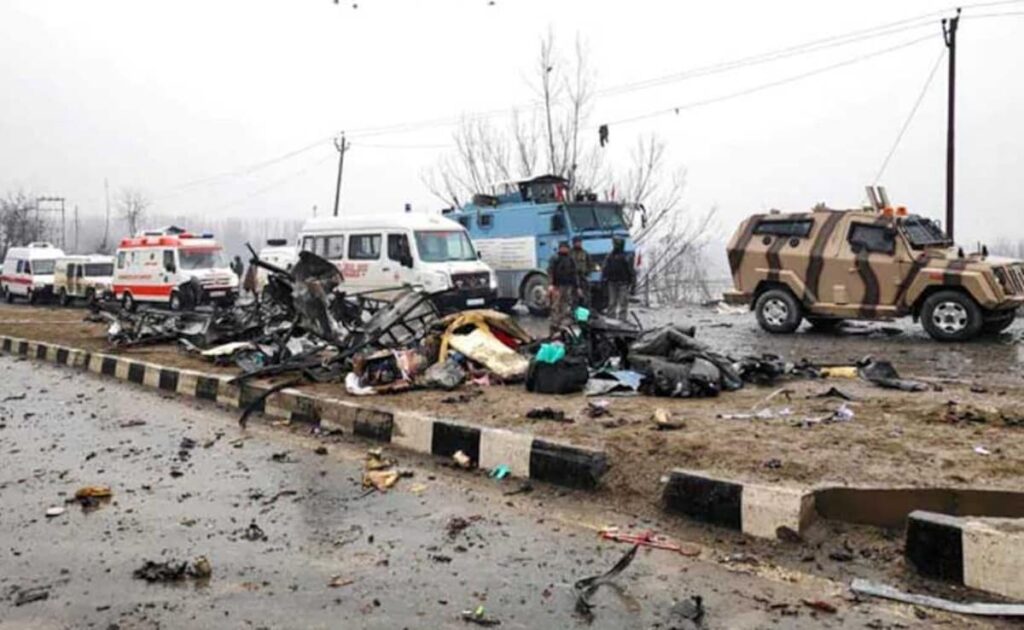આજે, ૧૪ ફેબ્રુઆરી, ભારતીય ઇતિહાસમાં કાળા દિવસ તરીકે ઉજવવામાં આવે છે. ૨૦૧૯ માં આ દિવસે, દેશના ઇતિહાસમાં સૌથી ઘાતક આતંકવાદી હુમલાઓમાંનો એક થયો હતો. જમ્મુ અને કાશ્મીરના પુલવામામાં સેન્ટ્રલ રિઝર્વ પોલીસ ફોર્સ (CRPF) ના કાફલાને નિશાન બનાવતા એક આત્મઘાતી હુમલામાં ૪૦ બહાદુર સૈનિકોના દુઃખદ મોત થયા હતા.

આ હુમલાનું આયોજન પાકિસ્તાન સ્થિત આતંકવાદી સંગઠન જૈશ-એ-મોહમ્મદ (JeM) દ્વારા કરવામાં આવ્યું હતું.
તેના કારણે ભારત અને પાકિસ્તાન વચ્ચે તણાવમાં પણ તીવ્ર વધારો થયો.
આજે, જ્યારે આપણે આ ભયાનક આતંકવાદી હુમલાની છઠ્ઠી તિથી યાદ કરી રહ્યા છીએ, ત્યારે શું થયું અને ભારતે કેવી પ્રતિક્રિયા આપી?
૧૪ ફેબ્રુઆરી, ૨૦૧૯ ના રોજ બપોરે, સેન્ટ્રલ રિઝર્વ પોલીસ ફોર્સ (CRPF) નો કાફલો ૭૮ વાહનો અને ૨,૫૦૦૦ થી વધુ સંસદીય જવાનો સાથે જમ્મુ-શ્રીનગર રાષ્ટ્રીય ધોરીમાર્ગ પર મુસાફરી કરી રહ્યો હતો.અચાનક, ૨૨ વર્ષીય આદિલ અહમદ ડાર, એક આત્મઘાતી બોમ્બરે વિસ્ફોટકોથી ભરેલી કાર સાથે બસોમાંથી એકને ટક્કર મારી દીધી, જેના કારણે એક મોટો વિસ્ફોટ થયો.
આ તાજેતરના ઇતિહાસમાં ભારતીય સુરક્ષા દળો પર થયેલા સૌથી લોહિયાળ હુમલાઓમાંનો એક હતો, જેમાં CRPF ના ૪૦ સભ્યોએ દુઃખદ રીતે પોતાના જીવ ગુમાવ્યા.

સંયુક્ત રાષ્ટ્ર, યુનાઇટેડ સ્ટેટ્સ, રશિયા, ઓસ્ટ્રેલિયા, ફ્રાન્સ, સાઉદી અરેબિયા, શ્રીલંકા અને બાંગ્લાદેશ સહિત દેશોએ આતંકવાદના આ ઘૃણાસ્પદ કૃત્યની નિંદા કરી અને ભારતને લડાઈમાં ટેકો આપવાની ઓફર કરી.આ હુમલાનું આયોજન પાકિસ્તાની આતંકવાદી સંગઠન જૈશ-એ-મોહમ્મદ (JeM) દ્વારા કરવામાં આવ્યું હતું. પાકિસ્તાનના આતંકવાદીઓ બે વર્ષ લાંબા ઓપરેશનના ભાગ રૂપે ભારતમાં ઘૂસણખોરી કરી હતી.
બોમ્બર, આદિલ અહમદ ડાર, દક્ષિણ કાશ્મીરના પુલવામા જિલ્લાના કાકાપોરાનો મૂળ કાશ્મીરી જેહાદી હતો. તે JeMનો સભ્ય હતો.
મુખ્ય કાવતરાખોર, મોહમ્મદ ઉમર ફારૂકે, પુલવામા આતંકવાદી હુમલાને અંજામ આપવા માટે ગુપ્ત રીતે ભારતમાં પ્રવેશતા પહેલા અફઘાનિસ્તાનમાં વિસ્ફોટકો માટે તાલીમ લીધી હતી.
હુમલા માટે, જાન્યુઆરી 2019 માં મારુતિ કારને રૂપાંતરિત કરવામાં આવી હતી અને તેમાં RDX, કેલ્શિયમ એમોનિયમ નાઈટ્રેટ, એલ્યુમિનિયમ પાવડર અને જિલેટીન સ્ટીક સહિત આશરે 200 કિલો ઉચ્ચ કક્ષાના વિસ્ફોટકોનો સમાવેશ થતો હતો.
આ આતંકવાદી કાર્યવાહીનું આયોજન અને નિર્દેશન કરનારા જૈશ-એ-મોહમ્મદના કમાન્ડરોમાં અમ્માર અલ્વી, રૌફ અસગર અને મસૂદ અઝહરનો સમાવેશ થાય છે.
ભારતે બાલાકોટ ઓપરેશન શરૂ કર્યું
ભારતે પુલવામા હુમલાનો જવાબ જોરદાર લશ્કરી કાર્યવાહીથી આપ્યો.
પાકિસ્તાનના ખૈબર પખ્તુનખ્વાના બાલાકોટમાં સ્થિત સૌથી મોટું જૈશ આતંકવાદી તાલીમ કેન્દ્ર, ભારતીય વાયુસેના (IAF) દ્વારા 26 દિવસ પછી 26 ફેબ્રુઆરી, 2019 ના રોજ વહેલી સવારે બોમ્બમારોનું નિશાન બન્યું.
ઘણા મિરાજ 200 ફાઇટર જેટ્સે હવાઈ હુમલો કર્યો, જેમાં મસૂદ અઝહરના સાળા મૌલાના યુસુફ અઝહર દ્વારા સંચાલિત JeM ના બાલાકોટ તાલીમ કેન્દ્રને નુકસાન થયું.
સરકારી સૂત્રોના જણાવ્યા અનુસાર, JeM ના સ્થળો પર 1,000 કિલોગ્રામથી વધુ બોમ્બ ફેંકવામાં આવ્યા જેમાં લગભગ 300 આતંકવાદીઓ માર્યા ગયા.
ખૂબ જ સફળ ઓપરેશન, કોડ-નેમ ઓપરેશન બંદર, 1971 ના યુદ્ધ પછી પહેલી વાર IAF એ પાકિસ્તાની ક્ષેત્રમાં 65 કિલોમીટર સુધી ઘૂસીને નિયંત્રણ રેખાનું ઉલ્લંઘન કર્યું હતું.
ગુપ્તચર અહેવાલો અનુસાર, ભારતના હવાઈ હુમલાઓએ JeM ના અન્ય આયોજિત હુમલાઓને અટકાવ્યા.
ડોગફાઇટ્સ
ભારતની લશ્કરી પ્રતિક્રિયા બાદ ભારત અને પાકિસ્તાન વચ્ચે તણાવ વધી ગયો, અને 27 ફેબ્રુઆરી, 2019 ના રોજ, IAF અને પાકિસ્તાન વાયુસેનાના જેટ વચ્ચે ડોગફાઇટ્સ થઈ.
ભારતીય વાયુસેનાના MiG-21 બાઇસને પાકિસ્તાની F-16 ને સફળતાપૂર્વક તોડી પાડ્યું, પરંતુ MiG-21 સરહદ પાર ક્રેશ થયું.
વિંગ કમાન્ડર અભિનંદન વર્ધમાનને પાકિસ્તાની સૈન્ય દ્વારા કેદી બનાવવામાં આવ્યા હતા.
બધું હોવા છતાં, અભિનંદને નોંધપાત્ર સ્તરનું સંયમ જાળવી રાખ્યું. ભારતના રાજદ્વારી દબાણના જવાબમાં, તેમને 1 માર્ચ, 2019 ના રોજ મુક્ત કરવામાં આવ્યા.
તેમની હિંમતને કારણે, તેમને વીર ચક્રથી સન્માનિત કરવામાં આવ્યા.
પુલવામાના શહીદોને યાદ કરીને

આજે, આ ઘટનામાં જીવ ગુમાવનારા 40 CRPF જવાનોને શ્રદ્ધાંજલિ આપવામાં આવે છે.
શુક્રવારે, વડા પ્રધાન નરેન્દ્ર મોદીએ પુલવામા દુર્ઘટનામાં શહીદ થયેલા CRPF સભ્યોને શ્રદ્ધાંજલિ આપી.
X પરની એક પોસ્ટમાં, તેમણે લખ્યું, “2019 માં પુલવામામાં આપણે ગુમાવેલા બહાદુર નાયકોને શ્રદ્ધાંજલિ. આવનારી પેઢી તેમના બલિદાન અને રાષ્ટ્ર પ્રત્યેના તેમના અતૂટ સમર્પણને ક્યારેય ભૂલી શકશે નહીં”.

કેન્દ્રીય ગૃહમંત્રી અમિત શાહે પણ હુમલામાં જીવ ગુમાવનારા 40 CRPF સભ્યોને શ્રદ્ધાંજલિ આપી.
તેમણે કહ્યું, “આભારી રાષ્ટ્ર વતી, હું 2019 માં આજના દિવસે પુલવામામાં થયેલા કાયર આતંકવાદી હુમલામાં શહીદ થયેલા સૈનિકોને મારી હૃદયપૂર્વક શ્રદ્ધાંજલિ અર્પણ કરું છું”.
તેમણે એમ કહીને આગળ કહ્યું કે વિશ્વ આતંકવાદ સામે એક થયું છે, જે માનવતાનો સૌથી મોટો વિરોધી છે, અને મોદી વહીવટીતંત્ર આતંકવાદીઓ સામે “શૂન્ય-સહિષ્ણુતા” નીતિ લાગુ કરીને તેમને નાબૂદ કરવા માટે પ્રતિબદ્ધ છે.
છેલ્લા પાંચ વર્ષમાં CRPF માં નોંધપાત્ર ફેરફારો થયા છે.
એક વરિષ્ઠ અધિકારીએ રાઇઝિંગ કાશ્મીરને જણાવ્યું હતું કે, “અમારા નિકાલ પરના સાધનોમાં નોંધપાત્ર સુધારો થયો છે, અને અમારી તૈયારીઓ સુનિશ્ચિત કરે છે કે આતંકવાદીઓને મજબૂત પ્રતિક્રિયાનો સામનો કરવો પડે. હવે ડ્રોન સર્વેલન્સ દ્વારા સેનાના કાફલાની ગતિવિધિઓ પર નજર રાખવામાં આવે છે, અને સુરક્ષા વધારવા માટે કર્મચારીઓને બુલેટપ્રૂફ બંકરોમાં લઈ જવામાં આવી રહ્યા છે”.
વધુમાં, તેમણે કહ્યું કે આવા હુમલાઓને રોકવા માટે નવા SOP લાગુ કરવામાં આવ્યા છે અને રોડ ઓપનિંગ પાર્ટીઓ (ROP) સમકાલીન સુરક્ષા પ્રક્રિયાઓ અનુસાર વિશેષ તાલીમ મેળવી રહી છે.